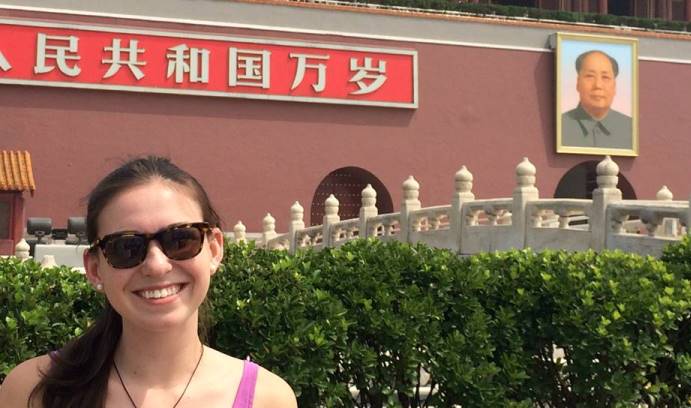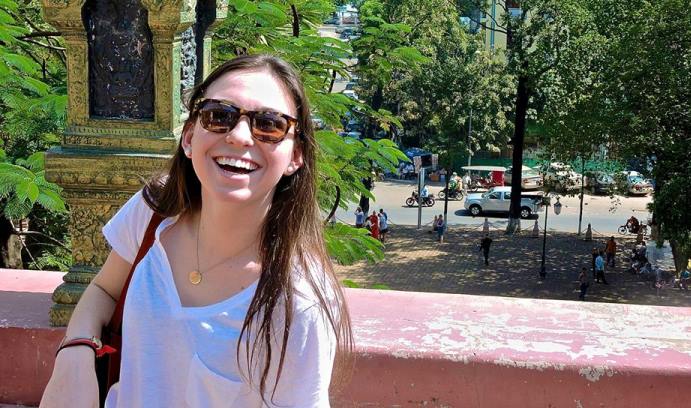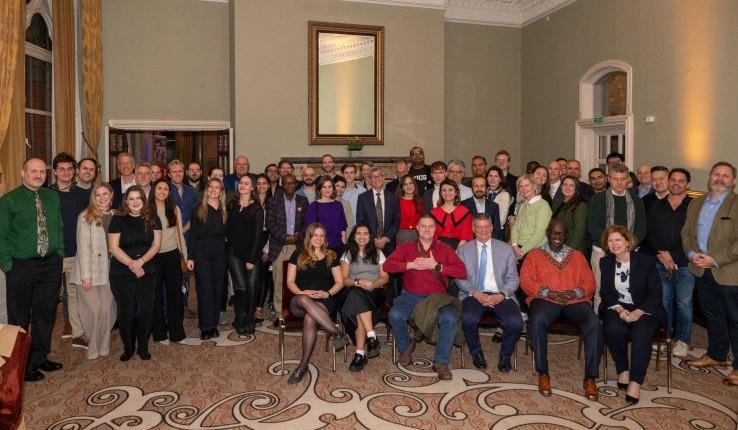Elusive emancipation

During one of her trips to China, Corina Fitzgerald ’17, an Asian studies and Chinese language double-major, made a visit to the Forbidden City in the center of Beijing. (Photo courtesy of Corina Fitzgerald)
Guan Moye was perhaps being tongue-in-cheek when he chose “Mo Yan”— Chinese for don’t speak—as his pen name.
Mo Yan has published dozens of novels and short stories in the past 35 years, and in 2012 he became the first Chinese citizen to win the Nobel Prize for Literature.
Those novels and stories, says Corina Fitzgerald ’17, shine a perceptive and often sympathetic light on the role that women have played in shaping 20th- and 21st-century Chinese history.
Fitzgerald, who just graduated with a double major in Chinese language and in Asian Studies, wrote her senior thesis on Mo Yan and titled it “Women’s Bodies as a Tool in Nation Building: The Creation of Modern Day China Through the Characters of Mo Yan’s Writing.”
She focused her thesis on three of Mo’s novels: Red Sorghum (1986), Big Breasts and Wide Hips (1996) and Frog (2009). She discovered strong women characters who help liberate China from foreign occupation but cannot achieve liberation themselves, who give their lives and bodies to build a modern nation but who end up becoming their own oppressors.
“What I saw throughout all of Mo Yan’s books is that women are used and in the end, none of them succeed,” says Fitzgerald. “Mo creates strong characters, but most of them die, fail or are haunted by the past. None of them ends up feeling liberated.”
Constance Cook, professor of Chinese in Lehigh’s department of modern languages and literatures, advised Fitzgerald to study the works of Mo and helped her shape her thesis topic. Thomas Chen, an assistant professor of Chinese well-versed in Mo’s writings, also offered suggestions.
Red Sorghum: Emancipation delayed
Red Sorghum spans a wide swath of Chinese history, from 1923-76, and deals mostly with the second Sino-Japanese War of 1937-45. The central character, Dai Fenglian, is born in 1907. Dai has a traditional Chinese upbringing, but decides at a young age to determine her own fate.
Like many of Mo’s works, Red Sorghum’s plot—and Dai’s fate as well—hinges on a twist of fate. Dai is arranged to marry a leper but is raped by a bandit before her marriage is consummated. Dai and the bandit become partners and have a child, says Fitzgerald, and in some ways forge a romantic relationship.
“The bandit ends up saving Dai from having to have sex with a leper but at the sacrifice of her body,” Fitzgerald says. “Often in Mo’s books, it is the male characters who use women who also save them.”
In her relationship with the bandit, Fitzgerald says, Dai achieves a degree of autonomy, but this is suppressed when the bandit takes a mistress. Dai is also told that to find liberation as a woman, that she must fight the Japanese, a struggle in which she is eventually killed.
“To find liberation and to emancipate themselves during this period of Chinese history,” says Fitzgerald, “women have to fight in the Resistance. This was first expressed by a women’s group in Shanghai in the 1930s.”
After the Communist Party came to power in 1949, the prerequisite for liberation was updated.
“Now, in order for women to find emancipation,” says Fitzgerald, “they have to join the Communist Party. So emancipation keeps getting delayed.”
Big Breasts and Wide Hips: The West delivers a son
Big Breasts and Wide Hips, says Fitzgerald, can be seen as a commentary on the future westernization of China. It is narrated by Jintong, the ninth and last child, and only son, of Lu Shangguan. The action takes place during the war with Japan, the rise to power of the Communists and the latter 20th century, with flashbacks to Lu’s childhood in the early 1900s.
Married to an impotent man, Lu has children by a series of lovers. In keeping with tradition, she most desires a son; this is reflected in the name she gives her eldest daughter, Laidi, which in Chinese means “younger brother coming.” When he finally arrives, Jintong is the product of a liaison his mother has with a Swedish missionary.
“The only way for Shangguan Lu to have a son is through a Swedish pastor—through a foreign power,” says Fitzgerald. “Mo seems to be saying that the only way Shangguan Lu can get the one thing she wants—a son—is from the West. If she can get that from the West, what can the whole country of China get from foreign powers?”
At the same time, says Fitzgerald, Mo also seems to be asking what foreign powers are taking from China. Jintong has a twin sister who is blind, lives in her brother’s shadow and receives much less of her mother’s nurture. “The fact that the blind sister gets very little attention from her mother shows what the West can get from China,” says Fitzgerald.
Frog: Women oppress women
Frog reveals the “violent truth” of the one-child policy launched by the Chinese Communist Party in the late 1970s, says Fitzgerald. It also shows women becoming a tool in their own repression. The protagonists are a gynecologist, Gugu, and her intern, Little Lion, who carry out the one-child policy through which millions of Chinese women were coerced into having abortions.
Gugu believes strongly in her work and blindly follows Party orders, says Fitzgerald. Not until she is retired and left with no one, having never had children, does she question the suffering she has caused to the women and men on whom she has performed forced abortions and sterilizations. In retirement, she makes clay dolls and sells them as symbols of fertility.
“Frog is very fantastical,” says Fitzerald. “Gugu creates in her mind the images of the thousands of fetuses that she has killed and sells them on the street as symbols of fertility to women and men who are hoping to have their own children.”
Meanwhile, Little Lion tries without success to have a child and conscripts a younger woman against her will to become the surrogate mother of her child.
“Little Lion wants a family, but she is too old, she’s infertile,” says Fitzgerald. “She has sacrificed her body to the nation by giving away her fertility. To get a son, she had to ruin another woman’s life. She also sacrifices her morality.”
From China to Cambodia
Fitzgerald, who is from Maine, became interested in the Chinese language when she attended a Chinese-immersion summer camp in New Hampshire the summer before eighth grade. Later, as a high school student at the Hotchkiss School in Connecticut, she spent a semester studying in Beijing.
“That experience led me to become an Asian studies and Chinese language double-major,” she says. “I knew I had to go back to China and keep learning.”
Fitzgerald spent her first semester of college at Peking University, and then enrolled at Lehigh. She studied the next two summers in China.
Last summer, Fitzgerald spent eight weeks in Siem Reap, Cambodia, working as an ESL (English as a Second Language) teaching assistant and helping to create a third-curriculum. The trip was made possible by Lehigh’s Iacocca International Internship Program and Caring for Cambodia, a program founded and directed by Bill Amelio ’79, ’08H, and his wife, Jamie Amelio.
“I had been to Cambodia once before with Lehigh’s Global Citizenship Program,” Fitzgerald says, “but I didn’t have any background in Cambodian history or culture. So I did an independent study class with Prof. Tannenbaum [Nicola Tannenbaum, professor of anthropology at Lehigh]. She really helped me prepare for the trip.
“I would never have been able to make that relationship, that connection, at bigger programs on other campuses. I have had so much support here—I really appreciate that aspect of Lehigh.”
Story by Kurt Pfitzer
Posted on:





